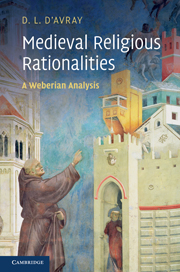Book contents
- Frontmatter
- Contents
- Preface and acknowledgements
- Abbreviations
- 1 Preliminaries
- 2 Medieval values: structures
- 3 Medieval values: dynamics
- 4 The value–instrumental interface in the Middle Ages
- 5 Formal rationality and medieval religious law
- 6 The formal–substantive interface and the dispensation system
- General conclusion
- Bibliography
- Index of manuscripts
- General index
1 - Preliminaries
Published online by Cambridge University Press: 05 June 2012
- Frontmatter
- Contents
- Preface and acknowledgements
- Abbreviations
- 1 Preliminaries
- 2 Medieval values: structures
- 3 Medieval values: dynamics
- 4 The value–instrumental interface in the Middle Ages
- 5 Formal rationality and medieval religious law
- 6 The formal–substantive interface and the dispensation system
- General conclusion
- Bibliography
- Index of manuscripts
- General index
Summary
RATIONALITIES AND IRRATIONALITIES
Rational thought is like oxygen in an atmosphere filled with many other gasses, from which this study isolates it artificially as an ‘ideal-type’ – one which designates ways of thinking mingled with, but distinguishable analytically from, the other less rational kinds. ‘Ways of thinking’ is in the plural here because there are different kinds of rationality. The question that this study tries to answer is: how did different forms of rationality – four to be precise – relate to and react with one another in the Middle Ages? The resulting analyses of medieval forms of thought run parallel with the more general analyses in the sister volume on Rationalities in History. The categories are from Max Weber – hence the subtitle. (It must not be misunderstood. Do not expect a ‘rise of Western rationality’ essay, nor discussion of whether the ‘Protestant Ethic and the Spirit of Capitalism’ had medieval origins, nor a literature survey of earlier work on Weber and the medieval West.) In this Weberian spirit, a pluralist approach to rationalities informs both studies: modern Western rationality is only one species (others being, say, Hinduism, or the ideology of the classical Greek city state), of one genus (the other main genus being instrumental rationality, found in all cultures and not to be identified crudely with the modern Western value system). Weber makes this clear, though he is not always understood in this way.
- Type
- Chapter
- Information
- Medieval Religious RationalitiesA Weberian Analysis, pp. 1 - 30Publisher: Cambridge University PressPrint publication year: 2010

